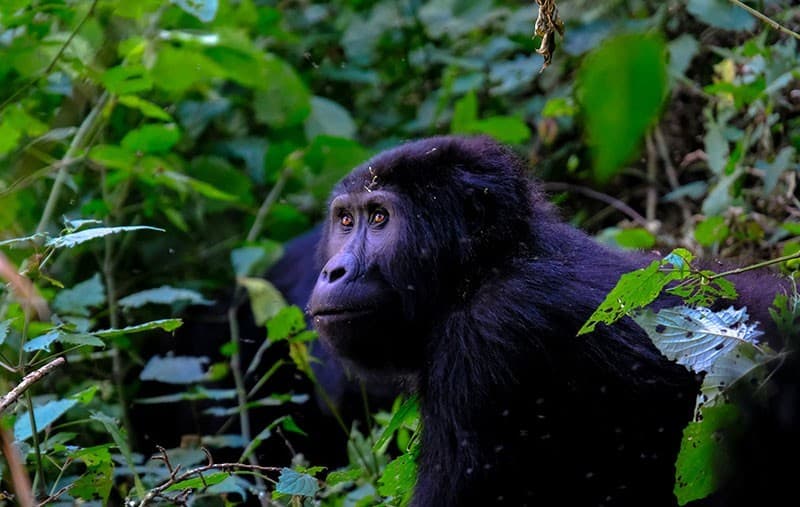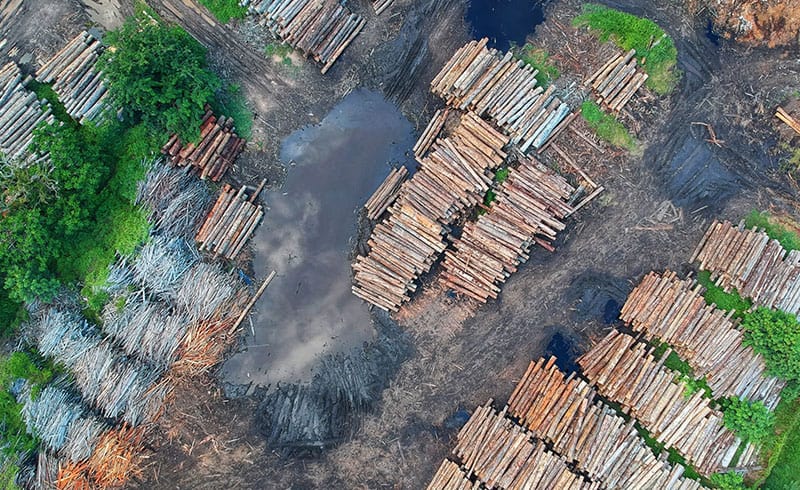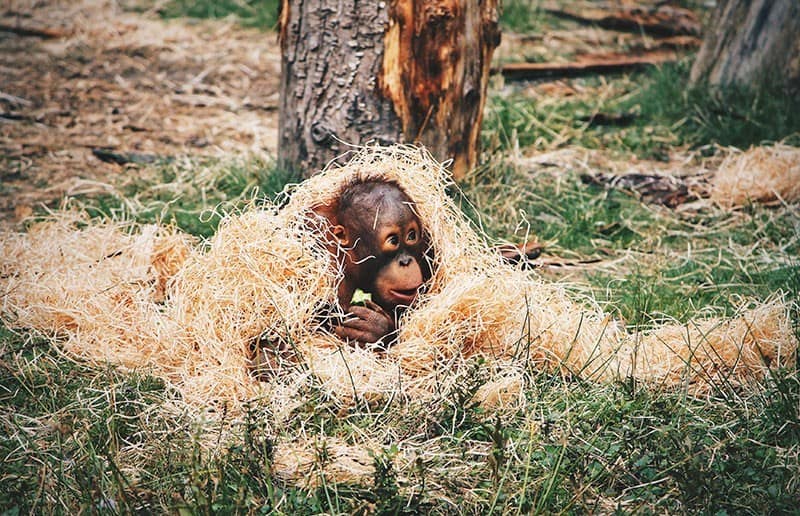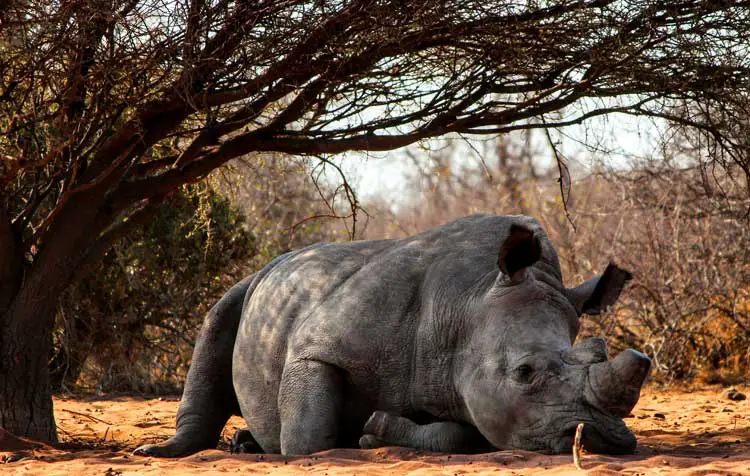What is actually meant by the term species extinction? Our everyday behavior and political and economic decisions have a massive impact on the animal and plant species that live on earth just like us. Human activity threatens more species today than ever before₁ and has led to one of the world's most important extinctions. biggest environmental problems of our time provoked. Deforestation of the tropical rainforest alone is causing the extinction of around 100 species every day.₂
In this article I want to give you everything you need to know about the definition, statistics, causes, consequences and solutions in the fight against species extinction and for a great biodiversity.
Here is another short Table of contents about the article:
What does species extinction mean?

In the Duden dictionary, species extinction is briefly described as the extinction of certain animal or plant species.₃ In the public debate, however, species extinction primarily refers to the loss of species due to man-made Environmental degradation and extinction.
In the same breath as species extinction, the term "extinction" is often used. Biodiversity. It describes the biological diversity of habitats, genes and species. The greater the biodiversity or species diversity, the more stable and healthy ecosystems are.₄
Species extinction statistics
Surveys, facts and figures compiled by experts are critical to addressing the complex issue of species extinction. Here are some statistics that underpin the reasons for the environmental problem and the urgency of solutions.
- Around eight million species of animals and plants live on Earth, including 5.5 million species of insects.₅
- About one million animal and plant species are threatened with extinction. This means that around one in eight animal and plant species is acutely threatened with extinction.₆
- Some 500,000 species no longer have vital habitat for long-term survival.₇
- 33% of fish stocks in the world's oceans were overexploited in 2015.₈
- 85% of the wetlands that existed in 1700 no longer existed in 2000.₉
- About half of the Earth's vegetated land area is agricultural land.₁₀
Which animals and plants are threatened with extinction?
Here I would like to give you some more examples of species that might not exist in Germany or on our planet in the near future.
Endangered species in Germany
When people think of the "extinction" of certain animal species, they usually have polar bears or rhinos in mind. But species extinction is also happening right on our doorstep in Germany. The following animal and plant species are threatened or endangered with extinction.
Animal species:
- Field hamster
- Lapwing
- Sea Eagle
- Wolf
- Lynx
- Bees
- …
Plant species:
- Arnica
- Corn cockle
- Heart spoon
- Bog violets
- …
Endangered species worldwide
On an international level, endangered animal and plant species certainly come to mind even more easily because of the greater, global media impact. Again, here are some examples for you:
Animal species:
- Mountain gorilla
- Orang Utan
- Panda
- Rhino
- Tiger
- Polar bear
- Sperm whale
- Shark
- Bees
- …
Plant species:
- Eagle wood
- Pimpernel
- Ardisia
- St. John's wort
- …
Of course, I can only mention a few prominent examples of endangered species here. The WWF regularly updates the Red List of threatened animal and plant species (IUCN)which provides you with even more detailed information.
Species extinction in history
Also in the eternal history of the earth one finds if one looks for similar changes of the environment. Here I would like to give you a short overview of the great mass extinctions of past times:
- 2.33 billion years ago: The first mass extinction, when the atmosphere was enriched with oxygen, the previously anaerobic living world died out.₁₁
- 444 million years ago: At the end of the Ordovician, it suddenly became very cold after previously high temperatures. Due to the high concentration of carbon dioxide and today's continents allowed the glaciers to expand and take the water from the sea.₁₂
- 372 - 359 million years ago: Oxygen depletion in the oceans, rising sea levels and the subsequent global temperature drop are believed to be the cause.₁₃
- 252 million years ago: In this extinction, 90% of all species that leave fossils were wiped out. Also 77% of all land animal species disappeared after this extinction.₁₄
- 201 million years ago: At this time in Earth's history, species extinction hit 75% of all species existing to date. Reefs in particular lost around 95% of their biomass. Here, too, volcanism and low sea levels were the cause.₁₅
- 66 million years ago: This time describes the extinction of the dinosaurs and the end of the Cretaceous period. It is estimated that the total species loss of this time is about 57%. The main cause is thought to have been the impact of an asteroid into the Yucatan Peninsula.₁₆
So the extinction of species is basically not a novelty. Nevertheless, depending on the species and the estimate, the extinction rate (or "background rate") is about 100- 10,000 times the values considered natural, which is about 1 - 3 extinct species per year.₁₇
Causes of species extinction

Even though there have already been several major species extinctions in history, there are natural clear reasons for the current rapid decline in biodiversity on Earth. Even if the cause research is clearly more complex, I would like to tell you now the main causes for the species extinction:
Industrial agriculture with poisons
Monotonous, industrial agriculture in particular is one of the main reasons for species extinction. It poisons the fields - in Germany alone, 48,000 tons of agricultural poison were sprayed in 2015.₁₈ Plants are losing their habitat as the nitrogen content in the soil also decreases. To make room for industrial agriculture, entire forests are being cleared - the tropical rainforest is particularly affected. As a result, the habitat of many species is lost, so that species extinction is the logical consequence.
Big industry & organic farmers in competition
Due to the fact that companies in industrial agriculture are in direct market competition with organic farmers with ecological farming, there is often also a lack of economic incentives for sustainable agriculture. Currently, only the price and the ideology of the free market count.
Preference for low-maintenance gardens & parks
Gardens and parks are very tidy these days - weed-free and low-maintenance green spaces are supposed to be. Many people prefer rock gardens with few plants and use insecticides to keep them tidy. If there is lawn, it is mowed regularly. These modern habits suffer do not provide a basis for biodiversity - and with the insects then disappear birds and other animals of the food chain.
Strain on the oceans
Under the Overfishing is understood to mean a higher removal of fish from the oceans than could be replenished by natural reproduction. The UN Food and Agriculture Organization reported that about 52% of the fish stocks in the ocean have been fished so intensively that no increase is possible.₁₉ Human-induced overfishing in turn deprives other marine animals of their food source, so that the populations of many other marine species are also reduced.
In addition, there was a Acidification of the oceans due to increased CO2-emissions from humans. Especially for shellfish and corals, the increased acidity is a danger.₂₀
The Waste load in the sea is also extreme and endangers marine animal and plant species. According to Nabu, around 135,000 marine mammals and one million seabirds die each year as a result.
You can learn more about this in the article about the big Garbage whirlpool in the sea.
Change in natural land areas
The environmental problem of the Deforestation naturally poses a massive threat to biodiversity on our planet. Between 1990 and 2015, 239 million hectares of the world's natural forests were destroyed.₂₁ As already described in the statistics, 85% of all wetlands have also been destroyed since the year 1700. The habitat for animals and plants is disappearing - and one of the logical consequences is species extinction.
Illegal Predation & Poaching
For example, through deforestation, we deprive animals and plants of their habitat. Through illegal poaching, hunting and animal smuggling, we also threaten many animal species. Shark fins, for example, are considered a delicacy in China₂₂, which is why the animals are hunted, stripped of their fins and thrown back into the sea.
What is particularly frightening is that many countries legalize poaching for wealthy interested parties.₂₃
Spatial boundaries through roads & urbanization
Due to global population growth (from 3.7 to 7.6 billion people₂₄ since 1970), urban areas on Earth have increased by more than 100% since 1992.₂₅ Here, too, we are depriving animals and plants of essential habitat.
In addition, we also ensure that the Environmental problem of air pollution This is the reason why the livelihoods of many species are disappearing. Roads also separate habitats from animal species that are unable to reproduce or reproduce much more slowly as a result.₂₆
Behavior of politicians, entrepreneurs & consumers
The majority of the Politicians and entrepreneurs strives for power & profit and thinks short term instead of long term. The German Minister of Agriculture Julia Glöckner openly confirms in a "promotional video" with the food company Nestlé that lobbying is a daily part of a politician's work.₂₇
Consumers want everything fast & cheap and buy short-lived instead of long-lived products. If you look around the supermarket, you see some Products with organic sealsbut the majority has no seal at all. Actually, natural organic products should be normality in supermarkets and products from genetic engineering or Factory farming be provided with an appropriate seal.
In my opinion, this is the social basis that is responsible for the extinction of species. Nevertheless, the 2019 European elections have also shown that a new awareness has arisen in our society that gives hope for the future.
Consequences of species extinction
Now we know the reasons for the current extinction of species - but what are the short- or long-term consequences of the decline in biodiversity? In this paragraph I would like to show you from an ecological as well as from an economic point of view how this environmental problem influences our coexistence on this planet.
Ecological consequences of species extinction
With every species that becomes extinct, biodiversity dwindles and with it the basis of life for other creatures. In Germany, the effects of species extinction can be described using a simple ecological chain reaction, which underpins how sensitive an ecosystem really is.
- Due to the poisoning of arable soils, they contain a significantly lower number of insects.
- However, these are an important food source for the field hamster
- Which in turn is the one favorite meal of the owl
- As this becomes difficult to find food, it leaves its habitat.
This short example shows how dependent the existence of many species is on other species.
Economic consequences of species extinction
Economic reasons are often cited for deciding against measures to save biodiversity. In the long term, however, species extinction has devastating effects on the economy. The following are some examples of the economic consequences:
- Food sources are lost: Not only animal and plant species are affected by the dwindling food supply, but ultimately also we humans, who are at the bottom of the food chain.
- Sources for pharmaceuticals are lost: We obtain our medicine from the plants of this earth. The decline in biodiversity thus threatens not only the animals that feed on them, but also our own medical care.₂₈
- Crop failure due to threats to crops: 210 to 515 billion)per year is the value of global crop yields at risk from declining pollinator populations.₂₉ In China, insect mortality has already reached such dramatic proportions that crop flowers must be pollinated by humans.₃₀
Thus, the extinction of species already has extreme consequences for our economy, which show that a rethinking is indispensable.
Solutions - What to do about species extinction?

Since we ourselves are responsible for the extinction of species, we can of course also counteract the environmental problem. But what does that look like in practice? What can I do myself in everyday life for against the extinction of species and for a wonderful biodiversity on our earth?
In the following I would like to give you a little inspiration for a most sustainable life in the sense of the protection of species give and besides point out, in what respect politics & economy must join our commitment.
What can each of us do?
Don't think that you can't influence the diversity of species on earth in everyday life. After all, human behavior created the problem in the first place. Here's how you have the best chance of being part of the solution to saving thousands of species of animals and plants:
Start or sign petitions
Through targeted signature campaigns in social media, every individual can uncover and change grievances. Simply start a petition yourself in the fight for biodiversity or join some existing petitions. Here are two nice examples at Open Petition and Change.org:
- SPECIES PROTECTION IN THE CONSTITUTION (Petition of the television presenter Dirk Steffens)
- Research biodiversity, stop species extinction (Michael Schrödl)
Set up garden meadow instead of rock garden
Promoting biodiversity in your own backyard isn't that difficult. It's even relatively convenient, since you don't have to mow your lawn anymore. Just give nature a little free rein and turn your smooth lawn into a biodiversity flower meadow. When the insects come back, you'll be able to enjoy more birdsong.
Tip: Plant protective hedges and build a nesting aid for bees, such as an insect hotel made from old Euro pallets. You can find more information in the article about the Creation of a bee friendly garden.
Vegan or vegetarian diet
Probably the most effective, everyday remedy against species extinction is the Start into a vegan diet without animal products. Even going without meat can make a crucial difference. Did you know, for example, that 1 kg of beef requires a total of around 15,500 liters of water?₃₁ But it's not just the water consumption of livestock farming that is enormous - forests are being cut down around the world for pastures and, above all, for the arable land for animal feed (mostly soy meal). Especially in the tropical belt.
In order to prevent the extinction of species and also the Stop climate changeSo the renunciation of meat and other products of animal origin helps. Look with pleasure suitably our article about the Relationship between nutrition and the environment an.
Buy organic food
Fortunately, our society is going through a fundamental change - we consume more consciously and rely more on organic products. In this way, we automatically promote nature conservation, since organic food usually comes from organic farming with many species of field weeds and low use of fertilizers.
Saving paper to save the forests
Of course, you can also save forests and biodiversity by valuing paper and the material it's made of. For example, save documents digitally instead of filing them away in thousands of folders. And if there's really no way around the printer, at least print on recycled paper and double-sided.
In the article about the Saving paper in everyday life you will get many more tips. Also the paperless office can be interesting for you.
Do not spend money on circus animals or souvenirs made of ivory
Sweden, for example, banned circus performances by elephants and sea lions in 2018. This is a valuable step towards protecting animal species. In your everyday life, you should avoid circus visits with animal participation and, for example, not bring home any items made of ivory or similar souvenirs.
Tip: More about sustainable souvenirs and what you should look for when buying souvenirs, you can read in the linked article.
Do not buy products with palm oil
Surely you know that for production of Palm oil rainforest cut down and destroyed. Instead, monotonous palm oil plantations are established, consisting of only one plant and offering no basis for biodiversity. With the App CodeCheck you can expose products with questionable ingredients such as palm oil within seconds by scanning the barcode. Try it out.
Notice: Just like large plastic parts is also Microplastics in the sea a major threat to biodiversity. Fortunately, with the CodeCheck app you can also detect whether, for example, in shower gel or other Products microplastics hidden.
Pick wildflowers, berries and herbs wisely
Of course, you're welcome to eat some wild raspberries. But keep in mind that wild plants like berries or herbs are also Food source of many animal species are and that such plants develop more quickly spreadif you just let them grow. Just be aware of that and don't pick off all the berries and herbs you can find right away.
Observe FSC seal when buying wood products
Illegal logging is the world's second largest business area of organized crime, with an estimated annual turnover of 30 - 100 billion euros.₃₂ As a consumer, you should therefore always look out for the FSC seal, which certifies that garden furniture, tables and other wood products are made from certified forest enterprises to originate.
Tip: You can get your Dining table also build yourself from old wooden planks. Look you with pleasure in the DIY Furniture Blog and let yourself be inspired.
Start & support actions for species protection
Of course, you can also help out yourself. For example, you can go to the beach in Germany or on a vacation trip abroad. even a Beach CleanUp against plastic waste and for the protection of the oceans and to organize it in our worldwide Beach CleanUp group on Facebook share
To support actions in Germany you can also simply enter the Dates database of the NABU look. There you can see the Events for example, filter by location, lecture, field trip, or nursing assignment.
What must politics & business do?
Even though we already have many starting points for saving species in our everyday lives, politics and business in particular are called upon to take action against species extinction. The following are some plans and ideas that need to be implemented.
- Ban on palm oil as an ingredient in consumer products
- Promotion of a vegan diet
- A strict ban on single-use plastic
- Establishment of further nature reserves and areas where nature is left to its own devices
- Provide stronger subsidies for farmers
- Renaturation of land₃₃
- Ubiquitous access to education and intensive outreach efforts around the Growth of the world population to end acceleration
- More wild growth in parks of the cities
- Strict measures against illegal logging
One always gets the feeling that many politicians make decisions based on the length of their own term in office. To stop the extinction of species, but must be thought of in the long term. For deforestation or similar overexploitation of nature, politicians often use the argument that they want to protect the economy. This is short-term thinking - because the economy is dependent on the laws of nature and not the other way around, we also preserve the economy in the long term by protecting species.
What about the future of biodiversity?

We all need to understand that everything on this planet is subject to the laws of nature and that we cannot simply shape the world as we please. Every private as well as political decision can lead to the extinction of further animal or plant species accompanied by the Climate change become extinct. In the same way, however, it can also ensure that species recover.
With the help of the tips from this article, each of us can already do our part to protect biodiversity in our everyday lives. In the end, everything depends on us escaping from ingrained habits and critically questioning things. The protection of nature and species must take priority over everything else, otherwise we ourselves will eventually lack the livelihood that enables us to live on this planet.
Do you have questions, suggestions or experiences with the topic of species extinction that you would like to share? Then feel free to write a comment below this article. Please share this article to educate as many people as possible.
Stay clean,

PS.: Since the main reasons for species extinction are of human origin, we can counteract this environmental problem on a daily basis. Feel free to read the article about the Tips for sustainable living inspire.
References:
₁ https://www.bmu.de/themen/natur-biologische-vielfalt-arten/naturschutz-biologische-vielfalt/biologische-vielfalt-international/weltbiodiversitaetsrat-ipbes
₂ https://www.abenteuer-regenwald.de/wissen/folgen
₃ https://www.duden.de/rechtschreibung/Artensterben
₄ http://www.bpb.de/gesellschaft/umwelt/anthropozaen/256780/artensterben
₅,₆,₇ Summary for policymakers of the global assessment report on biodiversity and ecosystem services of the Intergovernmental Science-Policy Platform on Biodiversity and Ecosystem Services, IPBES, 06.05.2019, p.13.
₈ Summary for policymakers of the global assessment report on biodiversity and ecosystem services of the Intergovernmental Science-Policy Platform on Biodiversity and Ecosystem Services, IPBES, 06.05.2019, p.12.
₉ Summary for policymakers of the global assessment report on biodiversity and ecosystem services of the Intergovernmental Science-Policy Platform on Biodiversity and Ecosystem Services, IPBES, 06.05.2019, p.3.
₁₀ https://www.faz.net/aktuell/wissen/22-schritte-gegen-das-globale-artensterben-16181995.html
₁₁ http://www.bpb.de/gesellschaft/umwelt/anthropozaen/256780/artensterben
₁₂,₁₃,₁₄,₁₅,₁₆ https://www.faz.net/aktuell/wissen/massenaussterben-fuenfmal-ging-die-welt-schon-unter-14424429.html
₁₇ https://www.spektrum.de/lexikon/biologie/artensterben/5204
₁₈ http://www.umweltinstitut.org/themen/landwirtschaft/artensterben.html
₁₉ The state of World Fisheries and Aquaculture, Rome, 2006, p.29.
₂₀ https://www.fnweb.de/fraenkische-nachrichten_artikel,-landwirtschaft-und-natur-das-artensterben-und-seine-folgen-darum-ist-artenschutz-ueberlebenswichtig-_arid,1139787.html
₂₁ https://www.wwf.de/themen-projekte/waelder/waldbericht-2018
₂₂ https://www.nzz.ch/panorama/aktuelle-themen/haifischflossensuppe-in-china-tierschuetzer-schlagen-alarm-ld.123682
₂₃ https://www.prowildlife.de/jagd-wilderei
₂₄ Summary for policymakers of the global assessment report on biodiversity and ecosystem services of the Intergovernmental Science-Policy Platform on Biodiversity and Ecosystem Services, IPBES, 06.05.2019, p.17.
₂₅ Summary for policymakers of the global assessment report on biodiversity and ecosystem services of the Intergovernmental Science-Policy Platform on Biodiversity and Ecosystem Services, IPBES, 06.05.2019, p.4.
₂₆ https://www.morgenpost.de/ratgeber/article207114153/Rote-Liste-14-000-Tierarten-in-Deutschland-sind-bedroht.html
₂₇ https://www.morgenpost.de/politik/article225952773/Ministerin-Julia-Kloeckner-lobt-Nestle-und-erntet-Shitstorm-Eskalation-bei-Twitter.html
₂₈ https://www.geo.de/natur/oekologie/11818-bstr-artensterben-fuer-die-medizin
₂₉ Summary for policymakers of the global assessment report on biodiversity and ecosystem services of the Intergovernmental Science-Policy Platform on Biodiversity and Ecosystem Services, IPBES, 06.05.2019, p.2.
₃₀ http://www.bee-careful.com/de/initiative/menschliche-bienen-china
₃₁ https://waterfootprint.org/media/downloads/Hoekstra_and_Chapagain_2006.pdf
₃₂ INTERPOL/World Bank. 2009. CHAINSAW PROJECT An INTERPOL perspective on law enforcement in illegal logging. INTERPOL General Secretariat, Lyon - https://www.interpol.int/Media/Files/Crime-areas/Environ-mental-crime/Chainsaw-Project-An-INTERPOL-perspective-on-law-enforcement-in-illegal-logging-2009
₃₃ https://www.zdf.de/nachrichten/heute/bericht-ueber-artensterben-verlangt-sofortiges-handeln-100.html






Sehr hilfreich vielen Dank 😀
With the WILD FLOWERS, BERRIES AND HERBS MAXIMUM IN MASS PLUGGING it should certainly be called Maaßen.
Moin Tim! Danke dir für dein Feedback und den Hinweis. Die Überschrift kann leider kein „ß“ – in dem Fall war es wirklich sehr unglücklich 😀 Habe den Satz entsprechend angepasst.
Many greetings
Christoph
du hast soeben meine komplette GFS gecarried danke 😀
Moin! Immer gerne 😀 Danke für dein Feedback!
Best regards
Christoph
Comments are closed.